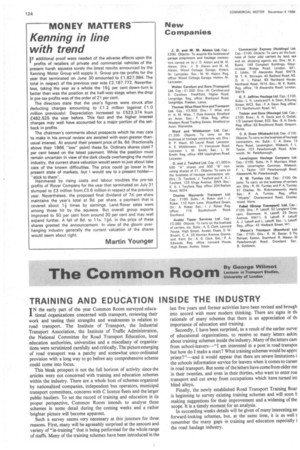Co By George Wilmot M Mc) n R oom Lecturer in Transport Studies,
Page 126

If you've noticed an error in this article please click here to report it so we can fix it.
University of London
TRAINING AND EDUCATION INSIDE THE INDUSTRY
IN the early part of the year Common Room surveyed educational organizations concerned with transport, reviewing their work and testing their strengths and weaknesses in relation to road transport. The Institute of Transport, the Industrial Transport Association, the Institute of Traffic Administration, the National Committee for Road Transport Education, local education authorities, universities and a miscellany of organizations were scrutinized carefully and critically. The picture emerging of road transport was a patchy and somewhat unco-ordinated provision with a long way to go before any comprehensive scheme could come into focus.
This bleak prospect is not the full horizon of activity since the articles were not concerned with training and education schemes within the industry. There are a whole host of schemes organized by nationalized companies, independent bus operators, municipal transport committees, concerns with C licence fleets and the larger public hauliers. To set the record of training and education in its proper perspective, Common Room intends to analyse these schemes in some detail during the coming weeks and a rather brighter picture will become apparent.
Such a survey seems very necessary at this juncture for three reasons. First, many will be agreeably surprised at the amount and variety of "in-training" that is being performed for the whole range of staffs. Many of the training schemes have been introduced in the last five years and former activities have been revised and brough into accord with more modern thinking. There are signs in thi rationale of many schemes that there is an appreciation of thi importance of education and training.
Secondly, I have been surprised, as a result of the earlier surve: of educational organizations, to receive so many letters askin; about training schemes inside the industry. Many of the letters cam from school-leavers-" I am interested in a post in road transpor but how do I make a start? What training schemes would be apprc priate ?"-and it would appear that there are severe limitations i the schools information service for leavers when it comes to career in road transport. But some of the letters have come from older me in their twenties, and even in their thirties, who want to enter roa transport and cut away from occupations which have turned int blind alleys.
Finally, the newly established Road Transport Training Boar is beginning to survey existing training schemes and will soon h making suggestions for their improvement and a widening of the scope. It is a timely moment for an analysis.
In succeeding weeks details will be given of many interesting an forward-looking schemes, but, at the same time, it is as well t remember the many gaps in training and education especially i the road haulage industry.








































































































































































